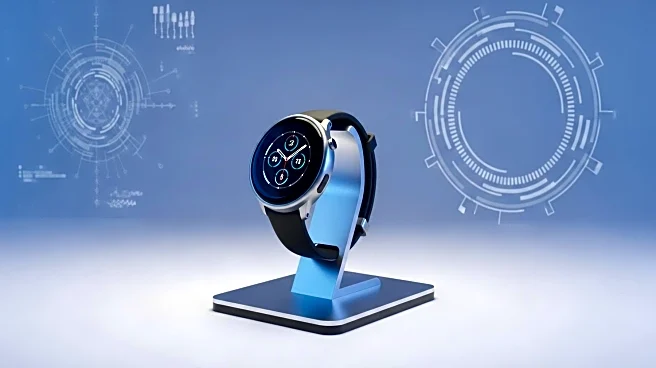What's Happening?
Oura, a Finnish healthtech company known for its wearable rings, is expanding its product offerings to capture a larger share of the wearables market. The company, which launched in 2015, has gained popularity for its minimalist design and ability to track various health metrics such as sleep patterns, heart health, and exercise levels. Despite projecting $1 billion in sales this year, Oura's CEO Tom Hale acknowledges that the company represents only 1% of the overall wearables market. To increase its market presence, Oura has introduced the Ceramic Oura Ring 4, priced at $499, which offers a fashion-forward design in four colors. Additionally, the company has enhanced its app with AI capabilities to provide users with personalized health insights. Oura's strategy includes partnerships with healthcare firms like Dexcom for blood glucose monitoring and Quest Diagnostics for blood biomarker tracking.
Why It's Important?
The expansion of Oura's product line is significant as it highlights the growing demand for wearable technology that combines health monitoring with aesthetic appeal. As consumers increasingly seek devices that offer actionable health data, Oura's focus on personalized insights through AI could set it apart from competitors. The wearables market is competitive, with established players like Apple and Fitbit, and Oura's ability to differentiate itself through design and functionality could influence consumer choices. The company's efforts to integrate fashion with health technology may attract a broader demographic, particularly younger consumers interested in both style and wellness. This expansion could also impact the healthcare industry by providing users with more accessible health data, potentially reducing reliance on traditional healthcare systems.
What's Next?
Oura plans to continue refining its offerings to enhance consumer appeal and increase market share. The company is exploring ways to make its products more affordable, potentially through subsidies from governments or employers. Oura's distribution strategy includes selling directly to consumers online and through retailers like Amazon and Best Buy. The company is also considering expanding its presence in sporting goods stores, which may require trained sales advisors to educate consumers on the benefits of its products. As Oura seeks to build a community around its wearables, features that allow users to share health data with friends could improve retention and engagement. The company's success will depend on its ability to innovate and offer meaningful health insights that resonate with consumers.
Beyond the Headlines
Oura's expansion into the wearables market raises questions about the ethical implications of health data collection and privacy. As the company collects more personal health information, ensuring data security and user privacy will be crucial. Additionally, the integration of AI in health monitoring devices prompts discussions about the accuracy and reliability of AI-generated health insights. The trend of combining fashion with health technology reflects broader cultural shifts towards prioritizing wellness and self-care. Oura's focus on aesthetic appeal may influence other companies to consider design as a key factor in product development, potentially leading to a new era of stylish health tech devices.











